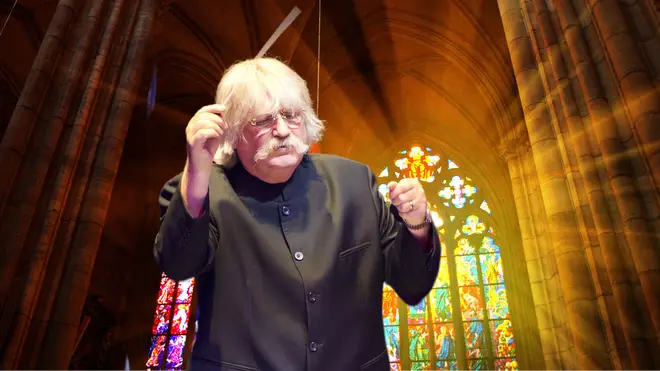On Air Now
Classic FM Breakfast with Dan Walker 6:30am - 9am
15 February 2024, 13:12 | Updated: 16 February 2024, 08:41

In celebration of his 80th birthday, we explore the much-loved Welsh composer’s most memorable works to date.
Sir Karl Jenkins is one of today’s best-loved composers, named the world’s most popular living composer in the Classic FM Ultimate Hall of Fame in 2015.
The Welsh composer’s musical output has been extraordinarily wide-ranging. While he is now best-known for his choral music, with his works like Adiemus and The Armed Man entering the repertoire of choirs worldwide, Sir Karl had his beginnings in jazz, prog rock and advertising music.
After training at the Royal Academy of Music, in the 1970s he played with Ronnie Scott’s jazz band and in prog rock group, Soft Machine. His eclectic musical background is partly what gives his music its distinctive sound, blurring the lines between classical, global music and jazz.
Last year, his classical harp concerto was heard by millions at The King’s Coronation. At that service he made headlines after being almost inexplicably mistaken for Meghan Markle.
When presenting Sir Karl with one of his many awards, Classic FM once said: “As a composer he recognises no boundaries – musical, commercial, geographical, or cultural. His is a way of thinking and composing that is perfectly in tune with the spirit of the times.”
Let’s explore some of his greatest works...
Watch now: Karl Jenkins conducts epic premiere with hundreds of musicians
Jenkins’ monumental Mass for Peace is his most performed work, presented close to 3,000 times in 50 different countries. In 2023, it achieved 1,000 weeks in the UK Classical chart and placed fifth in the Classic FM Hall of Fame, the highest position for a living composer.
Listen out for the ritualistic, quasi military sound of the ‘Sanctus’, the devastating high cello solo and crashing timpani of the ‘Benedictus’, and the soaring beauty of the ‘Agnus Dei’. A modern mass, with timeless appeal.

Sir Karl Jenkins explains what's so special about 'Benedictus'
‘Adiemus’ is almost impossible to categorise – which is just as its genre-defying composer would like it. The full-blown choral work, which is written in an invented language, combines classical and ‘world’ music influences to create a haunting, powerful piece that would top charts around the world.
It’s not uncommon for classical music to wind up in TV adverts. But in a more unusual turn of events, Karl Jenkins’ now most famous work was originally commissioned for an advert, for Delta Airlines. Sir Karl himself worked in advertising music for a while, following his stint in jazz and prog rock.
Read more: What are the lyrics to ‘Adiemus’ and what do they mean?

Karl Jenkins - Adiemus (Official Video)
Sir Karl wrote ‘Palladio’ in his advertising music era, for De Beers diamonds. Around the same time, he also wrote and conducted a piece for Levi’s jeans.
The work for string orchestra is one of Sir Karl’s most straight ‘classical’ works, inspired by a 16th-century Italian architect Andrea Palladio. From the off, rigid, resolute string lines become the basis for an increasing sense of drama from the higher strings.

Karl Jenkins Palladio
From Mozart to Verdi, Requiems have been penned by great composers throughout music history. This 2005 setting of the traditional Latin text has all the movements you would expect – a ‘Dies Irae’, a ‘Confutatis’ and a ‘Lacrimosa’. But the Welsh composer’s take is otherwise completely distinctive, with nods to the conventionally Western buried in a melting pot of musical styles from around the world.
Legendary New Zealand soprano Dame Kiri Te Kanawa, who recorded the ‘In Paradisum’, described Sir Karl’s compositions as “the most amazing, haunting music, that is instantly recognisable and loved across the world.”

Jenkins: Requiem - II. Dies Irae
A dramatic, reflective work, Sir Karl’s setting of the 13th-century prayer is a powerful musical expression of the suffering of Mary, during Jesus’ crucifixion.
The composer wrote it in 2008 for orchestra and choir, with Middle Eastern vocals and ancient instruments. In the recording, singer Belinda Sykes also performs on the duduk, an Armenian reed instrument. Once again, the composer puts his inimitable stamp on a much-touched text, which has been set by the likes of Haydn, Vivaldi and Dvořák before him.
Read more: 15 of the greatest classical choral works ever written

Jenkins: Stabat mater - V. Sancta Mater
Jenkins’ setting of the Latin Gloria, for chorus and orchestra, was commissioned by the Really Big Chorus for a performance at the Royal Albert Hall. Often performed in tandem with his ‘Te Deum’, both works were recorded with one of Jenkins’ biggest collaborators, the National Youth Choir of Great Britain.
The jewel in its crown is the exquisite ‘Laudamus Te’. If you already love his more famous ‘Benedictus’, give this a try.

Jenkins: Gloria - II. The Prayer: Laudamus Te
Composed as part of the Welsh maestro’s 75th birthday celebrations, the Miserere has a distinctly Middle Eastern flavour. Motivated by the atrocities of war and the millions of people displaced, Sir Karl dedicated the work to all those affected in conflicts in the Middle East over the last 70 years.
It was conducted by Stephen Layton, who said: “It’s rare I find myself singing things over and over again. There is something very enduring and uniquely wonderful here which I love.”
Its most popular moment is the gorgeously haunting ‘Miserere Mei, deus’.

Jenkins: Miserere mei, Deus